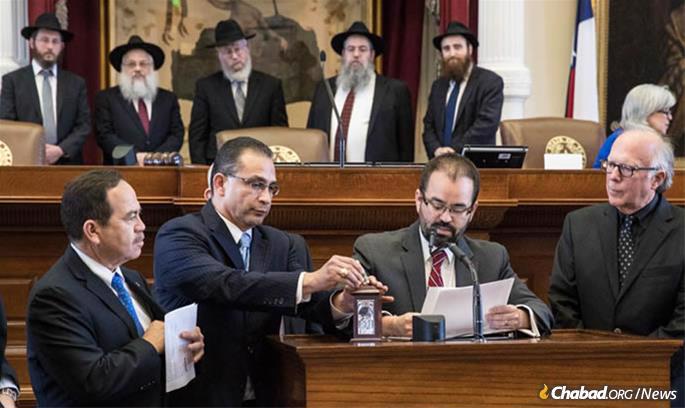A hush fell over the room as Rep. Joe Moody (D-District 78) took the floor of the Texas State Legislature. Behind him on the dais stood five fedora-clad rabbis, their head coverings on the house floor approved by special exemption. As they looked on, Moody raised a motion that would be echoed in various versions in more than 30 states, dozens of cities and in the nation’s capital.
“H.R. 1002 recognizes April 16th as Education and Sharing Day,” began Moody, the legislative body’s Speaker Pro Tempore. “It does so in the memory of Rabbi Menachem Mendel Schneerson, known as the Lubavitcher Rebbe.”
On the podium was a silver-plated wooden pushka, or charity box. “In 1974, the Rebbe introduced the ‘charity campaign.’ A grassroots campaign to train us to become ‘givers,’ ” said Moody. “The idea is simple. Place a box, like this one”—Moody held up the pushka and placed a dollar inside—“in your home or in your office, and start the day by setting aside a small amount to charity. Including our children in this practice encourages them and will help educate them to have empathy for our fellow human beings.”
As he spoke, representatives and aides took turns placing money in the pushka.
“Education Day” this year occurs on April 16, corresponding to the 11th of Nissan on the Jewish calendar and the 117th anniversary of birth of the Rebbe—Rabbi Menachem M. Schneerson, of righteous memory. Texas is one of the 31 states (as of this writing) to proclaim “Education Day” this year, with lawmakers in city, county, state and federal legislative bodies joining for events and discussions focusing particularly on the higher meaning of education. Annually, this message has resonated across party lines—a rare unifying space in an often fractured political and societal arena. Every president, both Democrat and Republican, since Jimmy Carter has signed a proclamation on what is today called Education and Sharing Day, USA. “The Rebbe believed that education is not only about the transmission of knowledge but that it is also integral to the formation of character,” reads this year’s presidential proclamation, signed this morning by U.S. President Donald J. Trump at the White House.
In Binghamton, N.Y., elected leaders from both sides of the aisle and from multiple levels of leadership—city, county and state—joined to mark the day. State Sen. Donna Lupardo, who co-sponsored the New York State “Education Day” resolution, was on hand with a copy of that proclamation. Lupardo described its passage as “an opportunity to pause and recognize our responsibility to ensure that our young people have the foundation necessary to lead lives rich in purpose and fulfillment.” Here, too, representatives took turns placing money in the pushka, a tangible demonstration of their personal commitment to teaching a more ethical lifestyle by example.

‘Contemplate and Reflect’
Among the concrete ideas the Rebbe championed was a “Moment of Silence” to begin each day in the public school system.
The Rebbe first spoke about a “Moment of Silence” in 1983, explaining that schools setting aside time for students to contemplate and reflect on something higher than themselves would benefit society at large, highlighting its inherently nonsectarian nature. Dozens of states have “Moment of Silence” statutes on their books, making it legal to institute it statewide, yet leaving the decision of whether or not to implement it at the local level.
Texas is one such state. In the wake of the deadly school shooting in Santa Fe, Texas, in 2018, Rabbi Yitzchok Schmukler of the nearby Chabad of the Bay Area in League City was asked to join a committee working to improve the physical safety and emotional well-being of the 41,000 students in the Clear Creek Independent School District. Once the immediate concerns of safety were addressed, Schmukler made recommendations and suggestions on how to enhance the implementation of Moment of Silence throughout the district’s 44 schools. It was enthusiastically adopted by the school district, which was in the midst of creating a character-building curriculum.
Schmukler suggested ways that the existing program could be better utilized as part of an overall effort to improve student well-being. “It’s been in the schedule for some time, but some students don’t fully understand what it’s all about,” he told Chabad.org. “The district is working on creating material that will enable teachers to explain [the idea behind the] Moment of Silence to their students. It’s already part of the schedule; we want it to be seen as the important part of the students’ well-being that it is.”
‘Education Day’ Across the Land
“Education Day” is not being observed only in the United States, but abroad as well, including, for the first time, in Jamaica. “Education and Sharing Day” in Jamaica was proclaimed by the Caribbean island’s Governor-General, Sir Patrick L. Allen, and explains that while “education develops the intellect through lessons in literacy, math and science,” nevertheless, “the character of our young people is strengthened by serving a cause greater than self, and by the anchor of virtues.”
As the world reflects on the higher meaning of education, the values of teaching and sharing are being brought to the forefront of public discourse. As Moody concluded, “If we all take a little bit of time, goodness and kindness will become routine in our lives, and no longer be just random acts of kindness.”








Start a Discussion